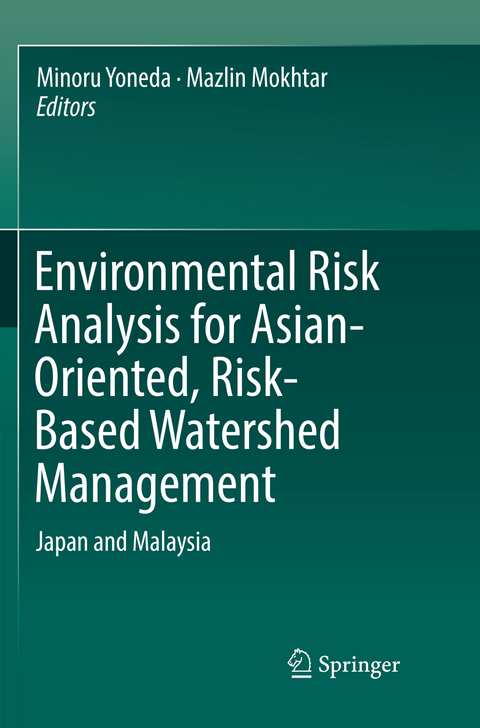
Environmental Risk Analysis for Asian-Oriented, Risk-Based Watershed Management
Springer Verlag, Singapore
978-981-13-4061-1 (ISBN)
This publication is a practical guidebook on environmental risk assessment, especially for watershed-scale management. It highlights case studies of watershed environmental risk in Malaysia, including the potential health risks as well as screening methods and management in practice. In order to apply environmental risk assessment methods for the management of toxic chemicals, it is necessary to consider the geological and climate features of each country as well as their cultural characteristics. Focusing on Malaysia as a representative country, the book also discusses studies in other Asian countries. The insights provided can be applied to advanced and developing countries alike. A suitable textbook for graduate students, it is also a valuable reference source for researchers, practitioners and policymakers.
Dr. Minoru Yoneda is a Professor of Environmental Risk Analysis at Kyoto University (KU) and currently vice dean of the school of engineering. He gained BSc, MSc and PhD of Engineering from KU. He is currently the president of the Society for Remediation of Radioactive Contamination in Environment of Japan and a board member of the Society for Risk Analysis Japan. He works on clarification of dynamism and exposure-dosage assessments of heavy metals and toxic organic chemical substances in general living environments to evaluate their risk for the public. He also aims to clarify the mechanisms of urban soil contamination with traces of harmful substances such as heavy metals and radioactive substances. Mazlin Bin Mokhtar is a Professor at the Universiti Kebangsaan Malaysia (UKM) whereby he is a Principal Fellow at the Institute for Environment and Development (LESTARI). He is currently the Chairman of Environmental Quality Council Malaysia as well as Deputy Head of Cluster of Natural Resources and Environment at the National Council of Professors (MPN). He is a Fellow of the Academy of Sciences Malaysia (ASM) and the Institute of Chemistry Malaysia (IKM). He is also a Senior Fellow at the Jeffrey Sachs Center on Sustainable Development (JSC), Sunway University. He has been appointed as a member of the Malaysia-Thailand Joint Authority Research Cess Fund Committee, SDSN Malaysia Chapter Leadership Council; Board of Trustees WWF Malaysia; Elected Member of the UKM Senate; NSC member of the UNDP SGP GEF Malaysia; Board Member of IRDI, International Medical University (IMU). His expertise is in Environmental Chemistry and his research interest is in Sustainability Science and Governance.
Preface.- Part I – Introduction.- Chapter 1: Watershed Pollutants: Risk Assessment and Management of Chemicals and Hazardous Substances.- Part 2: Situation of Environmental risk in a watershed.- Chapter 2: Potential Health Risk of Heavy Metals in Malaysia.- Chapter 3: Atmospheric Emission of Mercury in Malaysia.- Chapter 4: Indoor environmental pollution associated with floods or dampness.- Part 3: Screening methods of environmental risk in a watershed.- Chapter 5: Whole effluent toxicity: Tool for risk assessment and management of hazardous chemicals in watershed area.- Chapter 6: Environmental Toxicity and Evaluation.- Chapter 7: Epidemiological approaches to characterize human health risks from environmental exposure in a watershed.- Part 4: Management of environmental risk in a watershed.- Chapter 8: Environmental Scan and Framework of watershed Risk Assessment in Malaysia.- Chapter 9: Institutional Arrangement and Legal Framework for the Management of Watersheds in Malaysia.- Chapter 10: An Integrated Approach for Stakeholders Participation in Watershed Management.- Chapter 11: Transition of Hazardous Chemical Management and Environmental Risk Management and Evaluation in Japan.- Chapter 12: A history of water quality monitoring system in Japan.- Chapter 13: Environmental Dynamic Model of Chemicals for Risk Evaluation.- Chapter 14: Water Information Access ‘Communication Pack’: To Know Is to Care.
| Erscheinungsdatum | 04.03.2022 |
|---|---|
| Zusatzinfo | 28 Illustrations, color; 11 Illustrations, black and white; XII, 196 p. 39 illus., 28 illus. in color. |
| Verlagsort | Singapore |
| Sprache | englisch |
| Maße | 155 x 235 mm |
| Themenwelt | Naturwissenschaften ► Biologie ► Ökologie / Naturschutz |
| Naturwissenschaften ► Geowissenschaften | |
| Technik ► Umwelttechnik / Biotechnologie | |
| Schlagworte | environmental toxicity • Heavy Metal Contamination • Indoor environmental pollution • Mercury circulation • nutrient pollution • Waste water treatment • Water Footprint • Watershed conservation |
| ISBN-10 | 981-13-4061-7 / 9811340617 |
| ISBN-13 | 978-981-13-4061-1 / 9789811340611 |
| Zustand | Neuware |
| Informationen gemäß Produktsicherheitsverordnung (GPSR) | |
| Haben Sie eine Frage zum Produkt? |
aus dem Bereich


